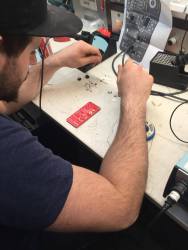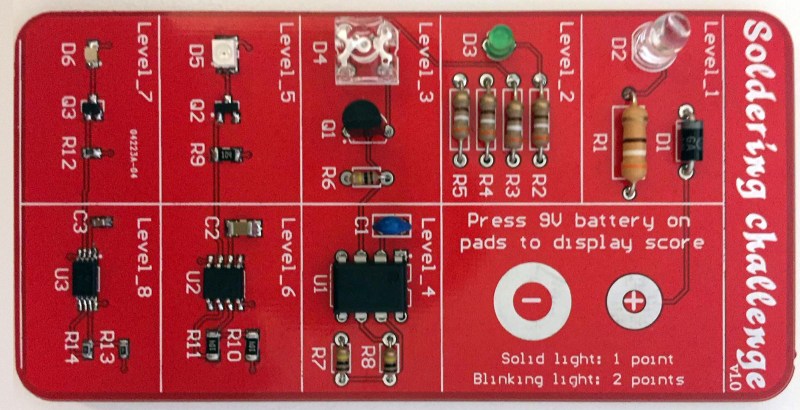[Rick] knew that the blinking, beeping microcontroller kits that are commonly used for educational soldering workshops just would not cut it for a serious combat among SMD reworking professionals. The “Soldering Challenge” he created to fill this gap is a little PCB with eight difficulty levels from large through hole components to the smallest hand solderable SMDs. After assembly, the circuit assesses the skill level of the soldering aspirant based on a built-in scoring system.
 The challenge is meant to be played on a time limit. There are no two same-sized components of different value, so contestants may focus on soldering fast. Little rubber pads on the backside of the board provide for good ground contact in the curves. After the starting signal, you will be confronted with a few through hole resistors, a capacitor, different LEDs and a DIP-8 IC. Here it’s all about the speed and efficiency as you tackle a track full of bends and cut-off resistor legs. Over the course of the challenge, the components get smaller and smaller, until you finally reach the 0603 level, with a tiny SC-85 MOS-FET and a TSSOP 555 timer at the finishing line.
The challenge is meant to be played on a time limit. There are no two same-sized components of different value, so contestants may focus on soldering fast. Little rubber pads on the backside of the board provide for good ground contact in the curves. After the starting signal, you will be confronted with a few through hole resistors, a capacitor, different LEDs and a DIP-8 IC. Here it’s all about the speed and efficiency as you tackle a track full of bends and cut-off resistor legs. Over the course of the challenge, the components get smaller and smaller, until you finally reach the 0603 level, with a tiny SC-85 MOS-FET and a TSSOP 555 timer at the finishing line.
After finishing, the contestants press a 9 V battery onto the marked pads to read their score from the LEDs. A steady LED counts one point, a blinking LED earns two. The design is available on CircuitMaker for free and fits the design rules of any dirt cheap board manufacturer, so everybody may join the challenge. If you score all 8 points under the current record of 17 m 21 s let [Rick] know to get your record on the league table. The video below lets you witness the very first contest held at the Attraktor makerspace Hamburg.
















I would have added a QFN as well. They are still hand solderable, but it takes time, skill and a good iron.
I agree. 0402 passives are also really common for me. I try to avoid 0201, but I think that would be an especially good challenge.
You sadist! :’)
Chuck Norris can hand solder a BGA. With his eyes closed.
Using his feet
in shoes
made of concrete
Under water.
With a soldering iron heated only by his anger.
And his beard for solder wick
Using a roofing / plumbing iron.
http://music-electronics-forum.com/attachments/6655d1255900051-pa180617.jpg
Totally agree!!
Dangling from his…
I keep planning to make http://www.delorie.com/pcb/smd-challenge/ in Kicad and trying out the real challenge – 01005. I agree that 0402 is quite doable by hand.
Ah, DJ Delorie! I used his DJGPP as my main compiler for years! 32-bit mode Windows port of the GNU C compiler, with a host of associated pseudo-Unix stuff around it.
Still not really sure what compiler to use now for actual Windows stuff. Not sure what Microsoft’s “free” compilers hide as limits. I learned Java enough to do small programs and applets, then forgot it again. Did Javascript back before it evolved into Skynet. Just want something to tinker with, really. Old Visual Basic, back on Windows 3.1, was nice and simple, got the job done. Was hideously ginormous, for the day, and slow. And unstable. Don’t imagine that’s improved 20 years and how many GB since.
Hot air rules.
As others have said, this would be more of a challenge if they went down to 0201 and added QFN. 01005 can also reliably be done by hand although at least some level of magnification is highly advised from my experience.
Nice challenge! I’m bad, so I’d be the one stuck at level 6. :p
Very cool board.
All that is missing is a BGA chip for 20 points. But as the comments above implied, only Chuck Norris could achieve such a feat.
You get *NO* points if you get the diode in the wrong way!
I wonder if the smallest chip is 0.5mm or 0.8mm. I struggle with large Quads that are 0.5mm
Try this https://youtu.be/5uiroWBkdFY with a proper tip and flux, size does not matter
Well that was SOIC (1.27mm) and 0.8mm and they’re easy. 0.5mm and 0.4mm have proportionally wider pins with less space in between.
With drag soldering, the pins “wick” the solder from the iron (capillary action), the size of the pins doesn’t matter much, as you are not trying to get to each one, even if some short, another pass of the iron will clear it
The effectiveness of that capillary action is dependent on the the ratio of pin width to pin spacing which is far less on 0.4mm and 0.5mm compared to SOIC and 0.8mm as far as I can see. I use the drag method on 0.4mm and 0.5mm as I can’t see the pins.
It makes sense you get no points if you fail level 1 (which has the diode). What is more of a bug is that you also seem to get 0 points if you accidentally short-circuit Vcc and GND on level 8.. well, no-one promised that electronics is fair.
The forelast level is bonding a COB to the board.
The last level is hand-carving a MCU out of a lump of silicon.
Have human beings ever done COB? Actually I suppose the answer is “yes, leagues of Chinese slave-children, for years, making those cheap digital photo-frame keyrings.”
No problem for them with their tiny little hands!
That’s not the smallest hand solderable size.
Chuck Norris could make the LEDs of Level 1 and 2 blink, too.
The component density should also reflect the package selection. Smaller parts should also be packed as tight as the manufacturing assembly rules allow for real life difficulties.
Give ’em a chance! It has to be hand-solderable. And a fair chance of getting somewhere with it, nobody wants a challenge they’ll never beat. You can design Level 9 with your own rules. Whittle it down to the champion solderer of the world! Wonder if Simon Cowell wants in on that?
There is no sense of smaller components if they are like quarter of an inch apart. It is not a challenge if everybody walks home with a ribbon. There are trained technicians that can solder things like that so it is not impossible.
Just maybe this isn’t test for trained technicians… if you take a look the tests around you, most of them aren’t made to distinguish from total noob to top trained professional with 20 years of experience.
This is sense in this. People often think the “can’t” do SMA work. This shows you can.
We need to take this to lvl 11
I’d buy this if a cheap kit were available.
Soldering TQFP micros has got me feeling down, need something to practise on!
this should be tagged under educational